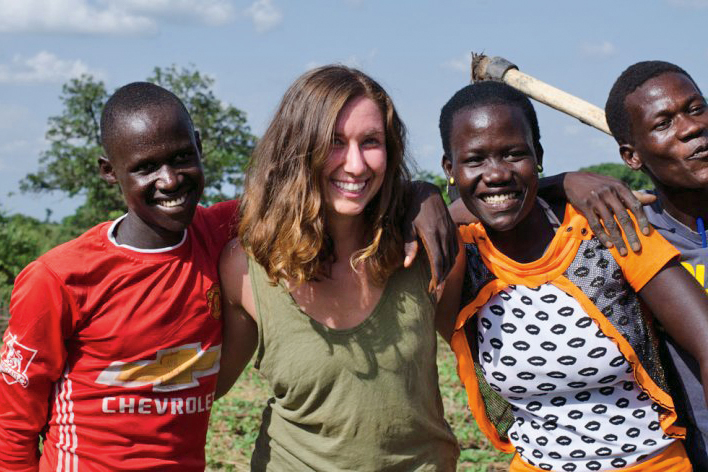Planting Seeds for Peace
Open gallery

Seren Villwock BA ’19 cut open the heavy, ripe watermelon she had purchased from the local market and smiled to find it bursting with seeds.
Several Ugandan students, mostly in their teens and early 20s, joined with her in eating the melon, capturing the healthy seeds in a pot of water and discarding the rest. Each student took home a small handful of seeds to dry and store or plant in their garden. “One student told me excitedly that if he was able to produce even one melon, his small bag of seeds was eventually going to fill his field with fruit,” says Villwock.
Last summer, from May to July, Max Clary BA ’18, Nellie Trenga-Schein BA ’17, and Villwock planted seeds—both real and metaphorical—in northern Uganda for their grant-funded Project for Peace. They received a $10,000 grant from the national 100 Projects for Peace initiative to pursue the project. Lewis & Clark students have won a grant each year since the program’s inception in 2007.
The Lewis & Clark team partnered with a local agricultural teacher, social workers, and Children of Peace Uganda. Their overarching goal was to promote peaceful self-reliance and empower a generation of former child soldiers and children affected by war who have missed out on education. “We worked to use our privilege to help build a brighter future for the children who grew up in war,” says Trenga-Schein.
The program was organized around a full growing season in northern Uganda. Each day, about 40 youth enjoyed a healthy lunch; attended a lecture on skills related to nutrition or agriculture; and then worked in a demonstration garden to practice sustainable agriculture techniques. As the training progressed, the participants began planting crops in their own fields and sharing their newfound knowledge with others, becoming mentors and leaders in their local communities. Eventually, they created seed-sharing networks within their own villages.
The team hopes the program itself will continue in the future via funding from KareMeKuc (which means “season of peace” in the local dialect), a nonprofit founded by the Lewis & Clark team to work toward long-term child soldier rehabilitation and reintegration. Trenga-Schein and Villwock plan to continue working with KareMeKuc, while Clary is transitioning to work directly with Children of Peace Uganda to build a Peace Center in the area.
“One of our students said the program helped him realize he has aunties, uncles, brothers, and sisters on another continent who care about him,” says Villwock. “Just to know that even one person who’s had such a hard life realizes that he is cared for and that he has a future is, to me, a really big success.”
—by Samantha Pratt BA ’20
More L&C Magazine Stories
Lewis & Clark Magazine is located in McAfee on the Undergraduate Campus.
MSC: 19
email magazine@lclark.edu
voice 503-768-7970
fax 503-768-7969
The L&C Magazine staff welcomes letters and emails from readers about topics covered in the magazine. Correspondence must include your name and location and may be edited.
Lewis & Clark Magazine
Lewis & Clark
615 S. Palatine Hill Road MSC 19
Portland OR 97219

